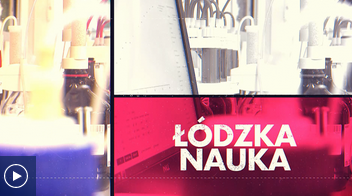The series began last November. So far (March 2024) 8 episodes have been released, showcasing 11 interdisciplinary and practical innovative ideas spawned at Lodz University of Technology.
What did we boast about?
The Science in Łódź series kicked off with ... edible packaging. Dr inż. Ilona Gałązka - Czarnecka and dr inż. Joanna Grzelczyk of the Faculty of Biotechnology and Food Sciences presented the project.
Should you eat ready-made meals? Nutritionists advise against it. Meanwhile, at the Faculty of BiNoŻ, technologies have been developed that endow convenience foods with health-promoting properties. This topic was discussed by prof. Grażyna Budryn, dr inż. Ilona Gałązka - Czarnecka, and university professor Agnieszka Nowak.
Next, presented were innovative textiles for applications in aircraft and drones. University professors Marcin Barburski and Zbigniew Draczyński, TUL's Faculty of Materials Technologies and Textile Design, spoke about the research conducted on these materials, whereas university professor Monika Malinowska Olszowy focused on a circular economy as it relates to textiles. In the same episode, dr inż. Przemysław Sękalski, TUL's Center for Information Technology, presented the advantages offered by a biodegradable and intelligent CPR training manikin which was developed as a result of intercollegiate cooperation.
Another episode portrayed pro-environmental research conducted at TUL. University professor Michal Puchalski, TUL's Textile Institute, and dr inż. Radosław Ślęzak, TUL's Department of Bioprocess Engineering, talked about biodegradable films, whereas university professor Katarzyna Zimna, TUL's Institute of Architecture of Textiles, reported on the international GreenTex project.
In the two February episodes of the Science in Łódź featured were the Faculty of Electrical, Electronic, Computer and Control Engineering and the Faculty of Chemistry.
Proud that our researchers' work helps people, we showcased research on dressings that accelerate the healing of burn wounds. Prof. Piotr Ulański of the Interdepartmental Institute of Radiation Technology explained gel dressings, and university professor Sławomir Kadłubowski guided the viewers through a lab where a particle accelerator enables the process of particle formation. Dr inż. Bożena Rokita expounded on the advantages and safety of hydrogel dressings developed at TUL.
In the next episode, the cameras peeked into the Institute of Applied Computer Science, where researchers are working on an AI technology to save electricity in the papermaking industry. University professor Jacek Kucharski and dr inż. Piotr Łuczak discussed the advantages that AI offers to control engineering, while dr inż. Piotr Urbanek emphasized the originality of the developed method.
That episode ends with a look at ultrasounds and the reactions they trigger, which is what scientists call sonochemistry. Dr Alicja Olejnik, prof. Piotr Ulański and dr inż. Bożena Rokita of the Interdepartmental Institute of Applied Radiation Chemistry introduce the viewers to this topic.
March episodes showcased the Center for Universal Design, where dr inż. Dorota Kamińska, dr inż. Grzegorz Zwoliński, and mgr inż. Agnieszka Dubiel from the Institute of Mechatronics and Information Systems were interviewed about the eXcape room. The project applies virtual reality to teach collaboration.
Dr hab. inż. arch. Rafał Szrajber and dr inż. Dominik Szajerman from the Institute of Information Technology talked about computer games designed at TUL and highlighted the studies on the technologies of their development, as well as the heterogeneity of their content, solutions, and applications.

